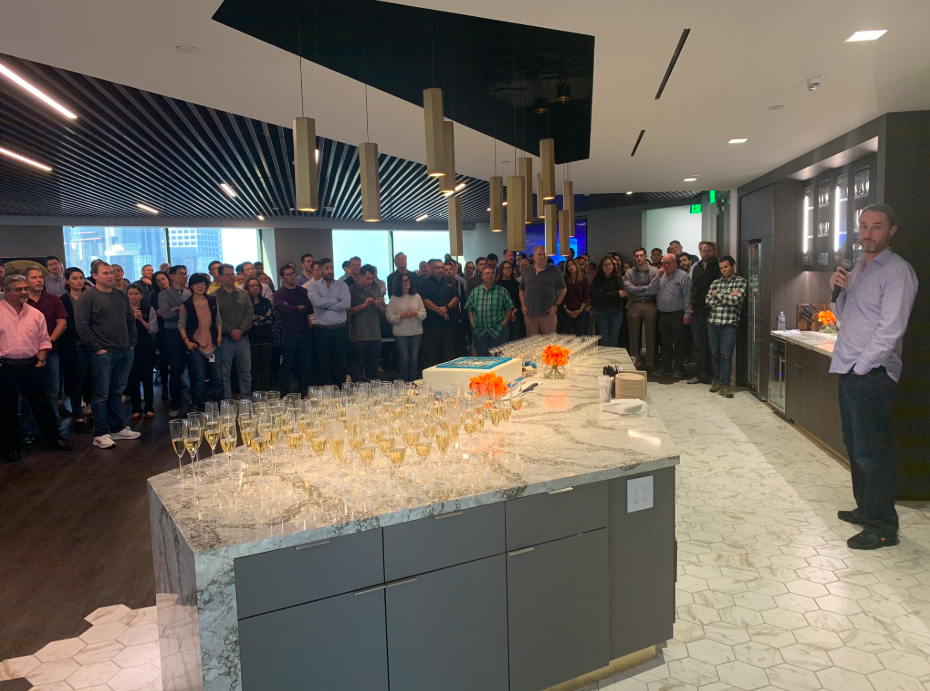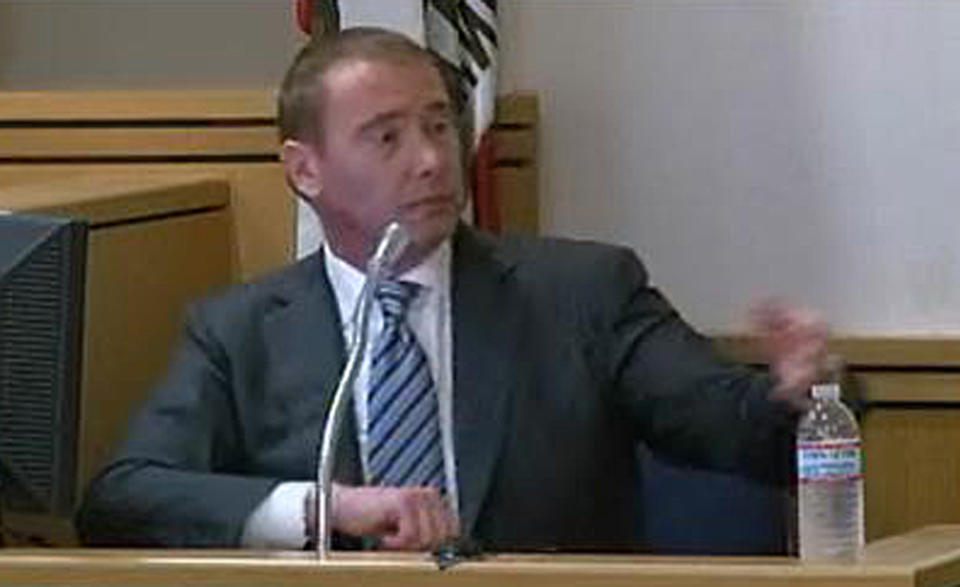From zero to $150 billion: The inside story of Jeffrey Gundlach's decade at DoubleLine
Bond king Jeffrey Gundlach toasted 10 years at DoubleLine Capital this week, and he has a lot to celebrate.
The 60-year-old billionaire’s upstart fixed income investment management firm was founded in 2009 with 45 loyal followers, and no money. It now has $150 billion in assets under management, making it possibly the fastest-growing investment management firm in history.
Amassing billions in assets, along with a track record of outperformance, is impressive. Yet the most remarkable story about DoubleLine is about the people. It's a tale of 45 people who quit their steady careers to join their former leader after his sudden and dramatic exit from their old firm.
Those people did so without knowing when they'd receive their first paycheck, while also enduring a contentious lawsuit early on that threatened the existence of their new venture. What it speaks to is their immense loyalty to Gundlach, and one another.
"What is the investment world about? Trust. You think of the word 'fidelity' — That's what this is built on. Fiduciary. It's about trusting people. It is embodying that true spirit of loyal to your client, loyal to one another, and doing it because you want to do it," said Jeff Sherman, DoubleLine's deputy chief investment officer.
While everyone has been loyal to Gundlach, he’s also been “pretty damn loyal to us, and he continues to be,” added Sherman.
Today, DoubleLine has expanded from the original team to more than 250 people, while maintaining its culture of entrepreneurship, shared success, and intellectual honesty. It's a culture Gundlach fostered in the decades before DoubleLine.
"It's the way we ran it for 20 years, as a firm within a firm. We started here, and then it was just a lot easier because when you're a firm within a firm, you not only have to manage people, you have to manage up, and I don't think I'm very good at managing up,” Gundlach told Yahoo Finance.
Speaking about his early years in the industry, the investor described people as being “threatened by me when I used to report to people. They always seemed threatened by me because I think I had more aptitude than the people that I was working with or for,” he said.
“And so they viewed me as a threat. And so we don't have that here. So everybody, I think, feels that it's a positive atmosphere,” Gundlach added.
‘Getting the band back together’

On Friday, December 4, 2009, a shockwave rippled across the trading floor at Trust Company of the West (TCW). A firm-wide email hit inboxes that informed the staff of Gundlach's termination, and that the firm was acquiring fixed income investment manager Metropolitan West Asset Management (MetWest).
Gundlach, who was TCW's chief investment officer, was also a nominee for Morningstar's Fixed Income Manager of the decade at the time. He was viewed as the leader and the moneymaker.
As one DoubleLine employee put it, TWC "killed the Golden Goose" that day. Gundlach was one of the few who accurately called the credit crisis and played defense for his clients, calling subprime in June 2007 a “total, unmitigated disaster and it’s only going to get worse.” In 2009, he went on offense, buying up the beaten-down mortgage bonds, and subsequently put up stellar returns.
The day after his termination, 14 TCW officers, including all of the portfolio managers and traders for mortgage-backed securities, gathered in Gundlach's Santa Monica home.
Using their BlackBerry smartphones, they emailed resignations to take effect immediately, in order to join Gundlach's new firm.
One employee recalled Gundlach, a former drummer in a rock band in the 1980s, said at the time, "We're getting the band back together."
[See also: Gundlach: The US stock market ‘will get crushed’ in the next recession]
TCW made "one major miscalculation. They thought I would just disappear," Gundlach told Yahoo Finance in a recent telephone interview.
That same weekend, TCW attempted to assuage concerns of the remaining staff. On Monday morning, TCW traders encountered MetWest traders sitting at their desks, which didn't sit well with many.
Over the coming weeks, another 30 people from various groups and departments would bolt TCW to follow Gundlach.
"When you see a bright star, like Jeffrey Gundlach, you want to follow someone like that because you just know he's going to be successful," said DoubleLine Group's president Ron Redell, who had been president of TCW's mutual funds and left to build DoubleLine’s mutual fund business.
Even the intern at TCW, Steven Wald, who was finishing his undergraduate degree, departed TCW to join DoubleLine that December amid the shakeup, calling the decision a "no brainer."
‘It got me committed’
Within 10 days, on December 14, Gundlach announced the formation of DoubleLine Capital backed by a minority investment by Howard Marks' Oaktree Capital.
By December 23, DoubleLine said it had registered with the Securities and Exchange Commission and planned to develop a suite of fixed income investment strategies, including core, mortgage-backed, investment-grade corporates, and emerging markets.
"I knew I wanted to join the firm the day it was founded," said Robert Cohen, director of DoubleLine's Global Developed Credit Group. Cohen wouldn't join until 2012 from another firm, but a Wall Street Journal article on Gundlach piqued his interest.
"I saw that article and thought, 'There's the guy you want to work for. Here's the guy who started an entire firm from scratch in about a week,’” Cohen told Yahoo Finance. “It got me not even interested — it got me committed."
Inside DoubleLine in those earliest days, a mountain of work had to be completed to get the firm up and running and the mutual funds launched.
The group of investment professionals— including Gundlach himself — took on roles they could never have imagined, from buying and setting up computers, building a compliance system, and taking tests to get licensed as wholesalers to sell the mutual funds.
"No one was too big to do anything. Everyone pitched in to make this work," recalled Andrew Hsu, one of the original team members. He serves as co-portfolio manager of the flagship Total Return Bond Fund.
Gundlach told Yahoo Finance that the team stepping up was a "real show of dedication and support," and he remembers that time as "blur of activity" since they had to climb a steep, sloping curve —quickly.
Some employees remember Gundlach assembling computers. During that first year, Gundlach wasn't holed up in the office, either. He was out getting the job done, visiting with financial advisors in strip malls, and even driving a van in the snow in Michigan to see clients.
"Most CEOs let their people do that. He was on the frontlines out there leading by example," said Redell.
Interestingly, this is the sort of entrepreneurial mindset of wearing different hats that has shaped the culture of the firm today, explained Patrick Townzen, DoubleLine's director of operations, who also joined in 2012.
"You had a lot of investment people, but there were a lot of non-investment things that had to get done to run the firm, whether it's pricing, whether it's sales, or client services, all those different things,” he told Yahoo Finance.
“I think that gave the investment people a lot of appreciation as to all the other things that go into running an investment management firm. That foundation has really impacted the culture going forward," Townzen added.
A lawsuit lingers

The excitement inside DoubleLine during those early days was overshadowed when, in early January 2010, TCW hit DoubleLine with a lawsuit with lurid allegations that would dominate the headlines in the financial press. A countersuit from DoubleLine followed.
What became quickly apparent was that launching the mutual funds was critical, as institutional money practically stopped calling amid the contentious litigation.
Astonishingly, in less than four months, on April 6, 2010, DoubleLine launched its first two open-end mutual funds: the DoubleLine Total Return Bond Fund (DBLTX), led by Jeffrey Gundlach and co-managed by Philip Barach; and the DoubleLine Emerging Markets Fixed Income Fund (DBLEX), led by Luz Padilla with co-managers Mark Christensen and Su Fei Koo.
On June 1, DoubleLine launched its third fund, the DoubleLine Core Fixed Income Fund (DLFNX), led by Gundlach and now co-managed by Jeff Sherman. On June 25, the flagship Total Return Bond Fund hit $1 billion in assets, while outperforming other major bond funds.
[See also: DoubleLine’s Sherman cites the 'biggest risks' investors should watch in 2020]
Looking back, DoubleLine, which specialized in a highly desirable asset category, emerged at the perfect moment in time.
"All the stars aligned when we launch the mutual fund companies, specifically our Total Return Bond Fund. That, to me, was perfect timing from a fund launch perspective," Redell said. "DoubleLine, it was meant to be. It was sort of written in the stars if you will."
Gundlach would later give a speech where he said, "If it hadn't been for Ron Redell, there would be no DoubleLine."
Sacrifices for success
The folks who joined DoubleLine walked away from significant salaries and were making no money in the early days of DoubleLine. They packed lunches, and one employee shared an email with money-saving tips.
Mark Christensen on the emerging markets team even created an internal spreadsheet to track AUM, to figure out where they'd eventually break even.
"There was an anxiousness, but it wasn't, for us... It was more of an anxiousness, especially with the lawsuit overhanging everybody," said Christensen.
While everyone had their unique situation, from putting their kids through school or taking care of their parents, they knew they had to pull together.
"That's where you look at each other in the eye and say, 'We've got to do this.’ We didn't have a choice. 'You need me to go somewhere? You need me to do something? What do we have to do to be successful?’" explained Sherman. "That's what made us as a firm. That gave us the culture."
Even to this day, the firm looks for that "roll up your sleeves and do the work" attitude, he said.
"We need to get something done — 'Who's going to do it?'“ Sherman asked. “There should be a line, and everybody should be lined up to do it. And those are the people who we are working with.”
Gundlach's talks
To motivate the team, Gundlach would give pep talks during status meetings in the conference room known as "Warhol," named after the artist.
"I used to say in the very early days, 'We've already raised $2 [billion]. If we can raise 2, we can raise 4. If we can raise 4, we can raise 8. We can raise 8; we can raise 16, and so on.' And, it's the first two that's actually the hard part," said Gundlach.
While Gundlach maintains he never doubted the firm would be successful, it wasn't clear to everyone that the firm would survive the litigation.
"There was a lot of negative news and a lot of stress internally amongst the most junior people all the way to the top," said Hsu.
If Gundlach were stressed, he never showed it, Hsu added. "He always operated as a calm individual.”
Another motivational talk that's remembered to this day is the "AON” speech, a trading acronym for "All Or None." If for some reason, DoubleLine didn't make it, Gundlach would make it a condition that entire team sticks together. In trader speak, it's a direction for a broker to complete a buy or sell order in full, so a shop can't just cherry-pick specific securities and leave others out.
"What I really remember about it is the emotion around it — him reassuring everyone that he was going to make sure everyone was taken care of, that he really appreciated that people took the risk and came over," recalled Monica Erickson, who heads up the investment grade bonds team.
A new bond king
In February 2011, Barron’s declared Gundlach "the new king of bonds" — taking that mantle from longtime fixed income titan Bill Gross.
As it happens, that year would prove to be a turning point for the firm.
In September, the DoubleLine team gathered in the Warhol conference room to watch a video feed of the jury delivering a mixed verdict in the pair of lawsuits. Subsequently, both sides entered settlement negotiations.
They were finalized that December, and to this day, remain confidential. What became clear, though, is that DoubleLine would live to fight another day.
That September, DoubleLine, which had been running in the red, finally broke even, and it also launched its Low Duration Bond Fund, which today is its fourth-largest mutual fund with $8 billion in AUM.
Freed from the litigation, DoubleLine’s already rapid growth picked up steam in 2012, with nearly $100 million in inflows daily. By mid-November 2012, the firm employed 78 people and was managing $50 billion — a milestone that took fewer than three years to hit, and surpassed the expectations of pretty much everyone.
The next month, DoubleLine celebrated its third birthday on the anniversary of Gundlach's termination at the restaurant downstairs in the TCW building with a large banner gloating, "DoubleLine $50 Billion."
At that event, Gundlach gave another speech where he told a story of that he thought his tombstone would say, "Always had a bid," an appropriate phrase for a trader. Now he said it would say, "Forty-five people jumped off the diving board into the swimming pool, not knowing if there's water. I'll never forget that."
[See also: Gundlach, who nailed Trump's 2016 election, says he'll win again 'if the economy holds']
Enduring the lawsuit, and the negative headlines and stress that came with it, ultimately brought the DoubleLine team closer together.
"I don't know how you can get closer than 40 people just getting up on a whim and walking away, but it brought us all closer," said Hsu.
It would be hard to break up the growing DoubleLine team now.
"We went through some of the most trying times doing this, starting this," said Sherman. "And, there's all the negative stuff that happened. I don't want to focus on that — what it really did is it pulled all of us together."
Being ‘careful’ about hiring

As DoubleLine has grown from the original 45 to more than 250 employees, the culture has remained intact as they've passed on the firm's philosophy.
"We are very careful about hiring people. We probably weight the personality fit maybe more than others. It's good. The bad part is it's an excruciating process to hire people, but the good part is if you do it right, you maintain the culture," said Cohen, noting they spend a lot of time and a lot of people are involved in the process, especially when thinking about the cultural fit.
While DoubleLine has grown its headcount, it's also expanded its lines of business and distribution channels. At one point, its flagship Total Return Bond Fund represented more than 70% of the firm's total AUM and now represents a little less than 40%, showing just how much the bond behemoth has diversified.
The key to that diversification has been expanding the talent.
"In the end, it's a human capital business and a collection of people. The interplay between the original people coming over and then the commitment of the firm to bring in talent to support our growth on top of that I think is really important," said Townzen.
"The firm has been committed to bringing in the best people we can for the roles we need to continue to grow the firm and ultimately continue to service the clients,” he added.
Those who join the firm learn that DoubleLine embraces a philosophy of intellectual honesty and shared success. Gundlach said that one of the "most destructive" characteristics of many investment firms is they have siloed units that tend to compete with each other.
DoubleLine hosts monthly fixed-income asset allocation meetings where the team leads — and pretty much anyone who wants to attend, discuss opportunities to put capital to work.
And no one is compensated by the amount of assets their team accumulates. Instead, it's based on the firm's performance, helping to foster a sense of intellectual honesty, Gundlach explained.
Gundlach, who is viewed internally as someone who empowers his employees, summed up his philosophy with a catchphrase: "No responsibility without authority, no authority without responsibility."
[See also: Gundlach: A recession will come, so investors should start 'playing defense right now']
It means that if something goes wrong, he takes the blame — and he professed that he doesn't raise his voice to employees.
"[My] other thing is I never yell at anybody. I believe that if something goes right, I'm more than happy to share the credit with everybody," said Gundlach.
"And if something goes wrong, I really think it's my fault. So that, I think people feel good that they're not being kind of kicked like a dog when things go wrong," he added.
Fortunately, it's been pretty smooth sailing at DoubleLine during its first decade. And as the firm looks to DoubleLine's next decade, the expanded team hopes to continue to make their leader proud.
"We have 250-plus people today. I would say this: 'If [Gundlach’s exit from the firm] happened today, instead of 40 people jumping it would be 250 people jumping,'" said Hsu.
Julia La Roche is a Correspondent at Yahoo Finance. Follow her on Twitter.
Read the latest financial and business news from Yahoo Finance
Follow Yahoo Finance on Twitter, Facebook, Instagram, Flipboard, SmartNews, LinkedIn, YouTube, and reddit.
